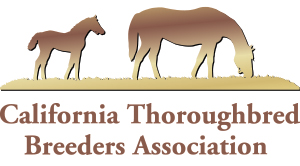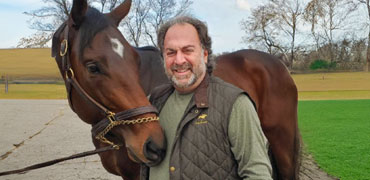EQUINE BOOK INSPIRES RACEHORSE OWNER
Joe Navarro has always loved horse racing lore.
“Movies like ‘Seabiscuit’ and ‘Secretariat’ were important,” said Navarro, a California Thoroughbred Breeders Association member since 2019. “They were great for horse racing and the country. We need stories like these in America today.”
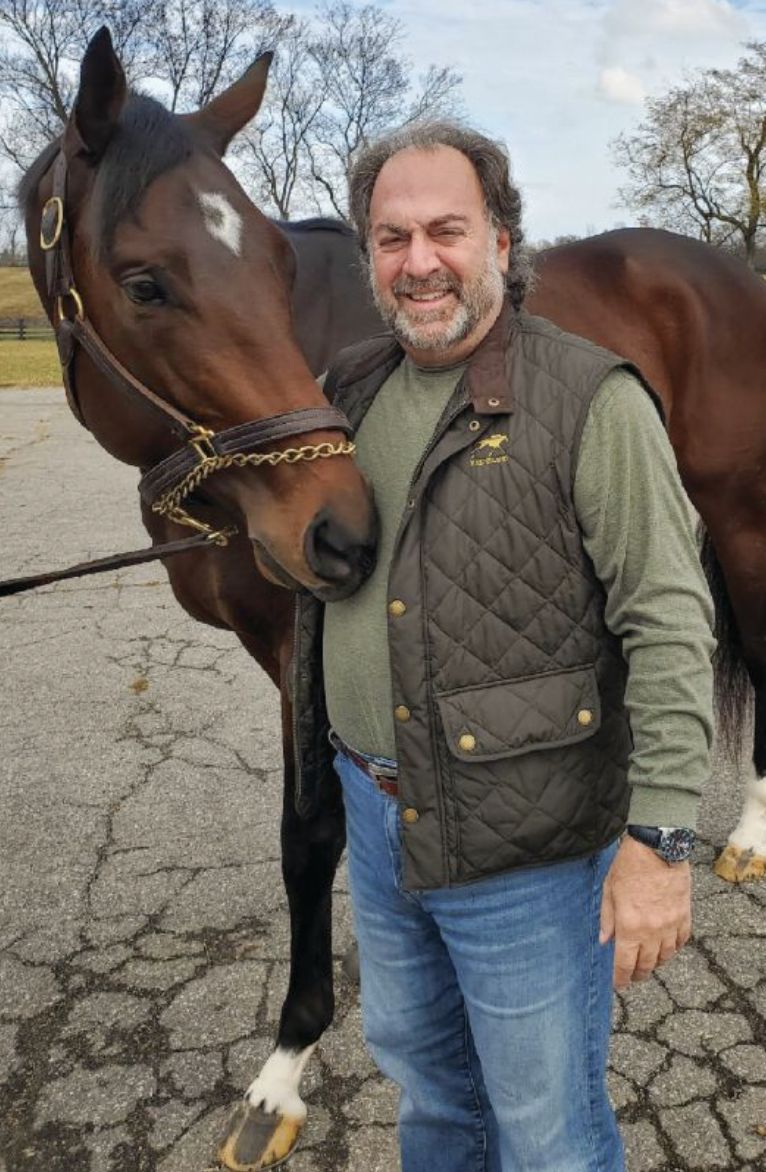
Joe Navarro owns several racehorses, including American Only
Navarro, who considers racing his hobby, is trying to add to that inspirational list.
One horse story has grabbed the Texas native’s attention like no other: Never Say Die—a near-dead new-born foal saved with a bottle of bourbon who became an international superstar. From that difficult beginning, the son of Nasrullah went on to win the 1954 Epsom Derby—the first Kentucky-bred to accomplish the feat—and the St. Leger Stakes, the oldest of the British classics, by a whopping 12 lengths.
That was only a part of the amazing true tale as described in the 2013 book, Never Say Die, written by James C. Nicholson. Navarro calls the story “Seabiscuit on steroids.”
It involves significant touchstones, both for racing and popular culture, beginning with renowned Jonabell Farm, where the foal was saved by the quick thinking of owner John A. Bell III. There’s an 18-year-old jockey named Lester Piggott, who would go on to become perhaps the greatest rider in British history; Robert Sterling Clark, a wealthy heir to the Singer sewing machine empire; Queen Elizabeth II; the Casbah Coffee Club in Liverpool; and the band that would become the Beatles, to name just a few of the subplots.
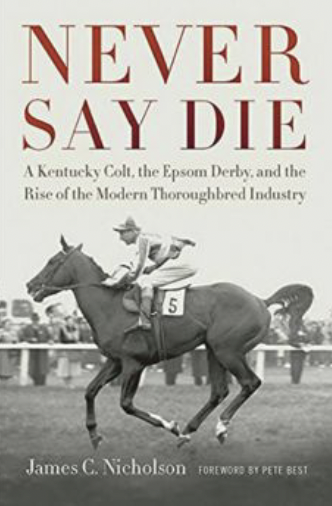 Most of all, the book describes how Never Say Die, through his international exploits, helped revive the long-depressed Thorough-bred breeding industry in the United States.
Most of all, the book describes how Never Say Die, through his international exploits, helped revive the long-depressed Thorough-bred breeding industry in the United States.
Navarro had one reaction after reading it: “This has got to be made into a movie,” and for the past five years, he has been working on doing just that.
He has little experience in cinema. Since 1990, he’s owned USA Wire & Cable Inc., a global distributor of insulated copper electrical cables to the energy-producing industry. Navarro also owns Quattro Navarro Farms, his horse business previously known as Ranch 007.
A small-scale breeder who races horses mostly with trainer Doug O’Neill in California, Navarro and his wife, Stacia, split their time between a 50-acre farm on Lake Travis in Austin, Texas, and Lexington, Ky., where he has a 12-acre ranch “across the street from Spendthrift Farm.” A resident of Rancho Santa Fe previously, he said he has also carved out time to attend the races each summer at Del Mar for the past 25 years.
Navarro bought the Lexington property a short time after attending the first Breeders’ Cup held at Keeneland in 2015, saying he fell hard for the small-town feel of Lexington, the racetrack, and the beautiful horse country surrounding the city. He learned of Never Say Die through Price Bell of Mill Ridge Farm, a famous bluegrass horse nursery where Navarro often sends his young horses.
Navarro has acquired the movie rights to Never Say Die and has been involved in discussions with potential producers. He has developed a “sizzle reel” and a pitch book to promote the movie project, which he estimates will cost about $10 million.
He spent a year co-writing a screen-play based on the book with an Austin friend, Mark Lehman, who was an experienced television screenwriter. Lehman unfortunately died last August, leaving Navarro to finish the job. At the same time, Navarro
has been in negotiations with LEX Studios in Lexington, a sister company of the Wrigley Media Group, for development and production assistance.
Navarro said he’s working toward the direction and casting of the film, which he hopes can begin shoot-ing later this year. He’s also encouraged by the reception he’s getting in Lexington.
“When people found out I was doing this, they came out of the woodwork” to offer support, he said.
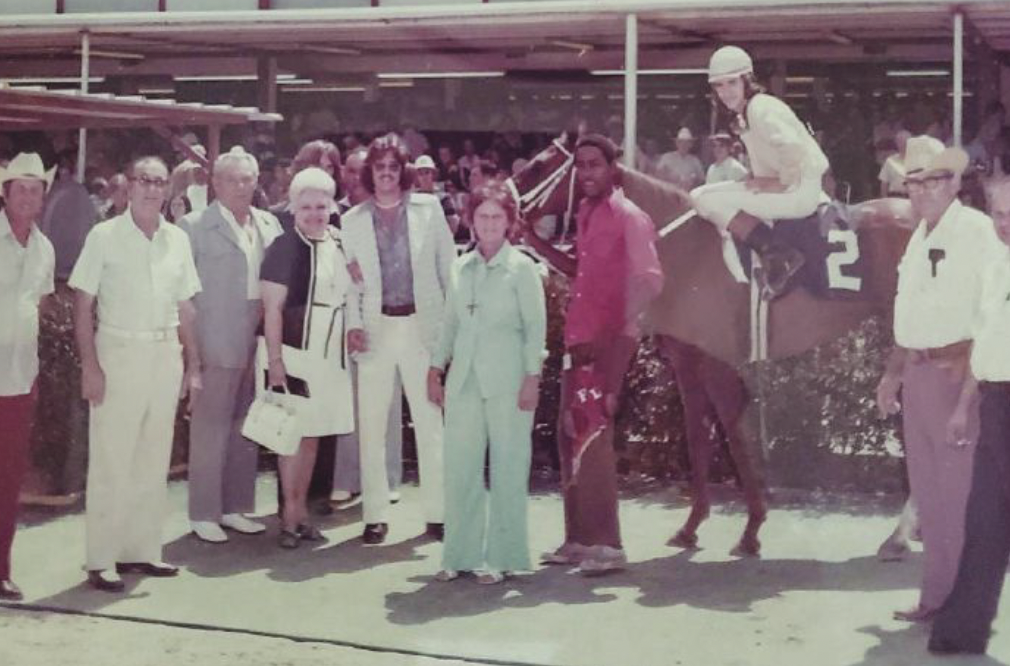
Navarro (white suit) at age 16 made his frst trip to the winner’s circle in 1975 at Evangeline Downs with winner Step Point
Born in Houston, Navarro got started in racing at 16, owning parts of a few horses that raced in Louisiana for his grandfather. He eventually began racing in California and has a long association with Miguel Jimenez, former farm manager at Ballena Vista Farms and now at Arroyo Vista Farm.
Navarro currently owns two California-bred fillies and a colt, all by I’ll Have Another. Castagna is a 3-year-old filly out of the multiple stakes-placed Tribal Rule mare Family Girl. Her full sister, 4-year-old Illhaveanotherkiss, has one win in 10 starts with a second and two thirds. Illhaveanother won, a 4-year-old colt out of the Point Given mare Doctor Carina, is yet to start.
“She’s just getting started,” Navarro said of Castagna, which means chestnut in Italian. “I don’t race my horses until they are 3. And once they have shown they can run, I don’t race them too hard. That’s just the way I do it.”
Navarro has high hopes for American Only. A 4-year-old Kentucky-bred colt by American Pharaoh, he was out of the money in two starts going long on grass in Kentucky in 2023 and has not start-ed this year for O’Neill. Navarro paid $100,000 for the bay at the Keeneland yearling sale.
“I saw American Pharaoh win the Breeders’ Cup Classic (G1 in 2015), and I decided I had to have a colt by him,” Navarro said. “I call (American Only) my gentle giant. I just love the horse. I love the lineage.”
He’s also partnered with Tim Cohen of Red Baron’s Barn and Rancho Temescal and others on a couple of European-based mares acquired as future broodmare prospects.
One of those is Khinjani, a 4-year-old Great Britain-bred daughter of Sir Percy who has raced twice at Santa Anita this year for trainer Mark Glatt. She won her U.S. debut off the plane impressively in an optional claiming allowance with Frankie Dettori aboard Jan. 21. She returned to run third in the Santa Ana Stakes (G3T) Feb. 24.
They also bought Montjica, a French-bred 4-year-old filly who is expected to make her U.S. debut at Del Mar this summer. Also to be trained by Glatt, she is a daughter of Zoustar.
“I love turf horses and turf racing,” Navarro said. “I think it’s classier and I love the European way of racing.”

